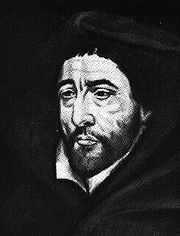Michael Bajus
Michael Bajus (actually Michael de Bay ; * 1513 in Melin in Hainaut , † December 16, 1589 in Leuven ) was one of the most important theologians of the Catholic Church in the 16th century . His teaching came to be known as bayanism.
Life and teaching
Michael Bajus became professor of theology at the University of Leuven in 1551 .
With his colleague Johann Hessels (1522–1566) he presented the Augustinian teachings of divine grace and was therefore violently attacked by the pelagianizing Franciscans, but nevertheless sent with Hessels in 1563 as a member of the Tridentine Council .
Then in 1567 Pius V rejected 76 sentences from Baju's more recent writings. The bull was not published until Bajus, who had obediently submitted, claimed that those sentences were not his teaching. The university refused to sign the "bull", and in 1578 Bajus even became chancellor of the University of Leuven. The dispute flared up more violently when Bajus and his colleagues had rejected 34 sentences by the Jesuit Leonhardus Lessius as Pelagian and immoral in 1587 .
His doctrine ( bayanism ; French baïanisme ) of sin, free will and grace, with which he also combined the denial of papal infallibility and the immaculate conception of Mary, as well as the assertion that episcopal power is directly from God, sought later to achieve ecclesiastical validity and recognition in Jansenism .
Works
The works of Michael Bajus were published by Gabriel Gerberon (1628–1711) (Cologne 1696).
literature
- Carl Ruland : Baius, Michael . In: Allgemeine Deutsche Biographie (ADB). Volume 1, Duncker & Humblot, Leipzig 1875, p. 776 f.
- Friedrich Wilhelm Bautz : Michael Bajus. In: Biographisch-Bibliographisches Kirchenlexikon (BBKL). Volume 1, Bautz, Hamm 1975. 2nd, unchanged edition Hamm 1990, ISBN 3-88309-013-1 , Sp. 349-350.
- Franz Xaver von Linsenmann : Michael Bajus and the foundation of Jansenism , Tübingen. 1867.
- Fleischmann, Alfons : The doctrine of grace of Wilhelm Estius and their position on bayanism. A dogma-historical study of the grace disputes of the late 16th century , (= Diss. Ludwig-Maximilians-Univ. Munich, 1937) - Kallmünz over Regensburg 1940. X, 184 pp.
- Augustin Sokolowski: Back to the fathers or: The new theology of Michael Bajus . July 2, 2008 (in German translation)
| personal data | |
|---|---|
| SURNAME | Bajus, Michael |
| ALTERNATIVE NAMES | Michael de Bay; Baius, Michael |
| BRIEF DESCRIPTION | Catholic theologian |
| DATE OF BIRTH | 1513 |
| PLACE OF BIRTH | Melin , Hainaut |
| DATE OF DEATH | December 16, 1589 |
| Place of death | Lions |
